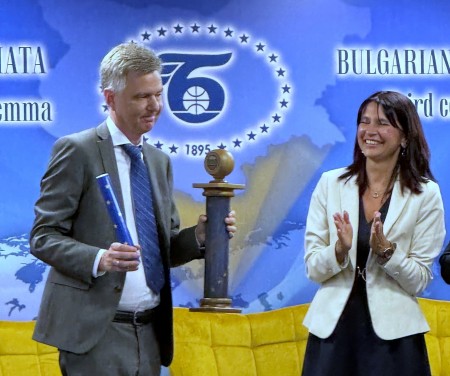The meeting of the Euroclub at the Bulgarian Chamber of Commerce and Industry on the occasion of the taking over the Presidency of the Council of the European Union by Denmark from July 1, 2025 was held at the premises of BCCI on July 9. Traditionally, it is attended by representatives of the diplomatic corps in Bulgaria, politicians, bankers, entrepreneurs.
The meeting featured the special participation of H.E. Flemming Stender, Ambassador Extraordinary and Plenipotentiary of the Kingdom of Denmark to Bulgaria; Mrs. Anna Janiszewska-Frączek, Deputy Head of Mission, Embassy of the Republic of Poland; Dr. Vasil Todorov, Vice President of the Bulgarian Chamber of Commerce and Industry (BCCI); Professor Ingrid Shikova, President of the Euroclub and moderator of the event; Petar Ganev, Senior Research Fellow at the Institute for Market Economics; and Oleg Temnikov from the Association "Transparency International – Bulgaria."
Bulgaria's membership in the eurozone will encourage and support the country's accession to the Organisation for Economic Co-operation and Development (OECD) throughout the next year. This was shared by Vasil Todorov, Vice President of the Bulgarian Chamber of Commerce and Industry (BCCI), during the opening of the meeting.
He expressed gratitude to Bulgaria's EU partners—every European country that supported the nation's accession to the eurozone.
"This is a very important and significant achievement for Bulgaria," Todorov said, adding that, alongside membership in the Schengen Area, the eurozone is expected to have a number of positive effects on the Bulgarian economy, such as increased investment, improved credit ratings, higher wages, and a boost to sectors like tourism and trade.
The next Multiannual Financial Framework of the European Union is expected to represent a significant fiscal reform of the EU. The European Commission is set to publish its first proposal on July 16, with the second part expected in September. Negotiations on the budget, which will be crucial, are scheduled to take place over the next 18 months. Professor Ingrid Shikova emphasized three key aspects in this process: the size of the budget, its focus on competitiveness, and the balance between innovation and cohesion policy.
Anna Janiszewska-Frączek, Deputy Head of the Embassy of the Republic of Poland, shared the outcomes of the Polish presidency, noting that Europe was in a period of great uncertainty due to the military actions in Ukraine and their impact on the continent's development. She highlighted the importance of the topic and the signing of partnership agreements between the EU, the UK, and Canada for enhancement of the security.
She also mentioned that Montenegro and Moldova's accession applications progressed during the Polish presidency, with the Business Forum for the Eastern Partnership being the most significant event in this area. Activities related to strengthening the EU's cooperation with several African countries were also mentioned. Fraček wished success to the Danish presidency, hoping it would carry forward the set objectives.
H.E. Flemming Stender, Ambassador of the Kingdom of Denmark to Bulgaria, presented the priorities of Denmark as the rotating President of the Council of the EU for the next six months of 2025.
The motto of the Danish Presidency is "A Strong Europe in a Changing World" and has two main directions - a secure Europe and a competitive and green Europe.
Ambassador Stender defined the moment of assuming the presidency as a fateful one, accompanied by major changes - the transformation of world trade, a change in the security environment, climate change and the need for an ambitious transformation of the competitiveness of the European economy, etc.
Regarding security, according to the diplomat, Europe must be responsible for its own security in cooperation with NATO. The Danish Presidency's program envisages actions in the following directions: security and defense; EU support for Ukraine; protection from illegal migration; sustainability of democracy and maintenance of European values and the rule of law; building global partnerships; a results-based approach to the enlargement process and economic security.
Ambassador Fleming Stender also congratulated Bulgaria on the decision of July 8 to introduce the euro in the country.
Petar Ganev, a senior researcher at the Institute for Market Economics, took a position on the topic of the upcoming adoption of the European currency in our country. He emphasized that the introduction of the euro is a major change, which is accompanied by inconvenience and a sense of uncertainty. The role of the state is to create conditions for a smooth transition and improve economic indicators that are not tied to the currency: jobs, wages, the level of pensions, he emphasized.
Oleg Temnikov, speaking for the Transparency International Association, presented the strengths and weaknesses of the draft directive of the European Parliament and the Council on the fight against corruption. It aims to modernize the EU legal framework for combating corruption by harmonizing the definitions and penalties for corruption in the member states.
